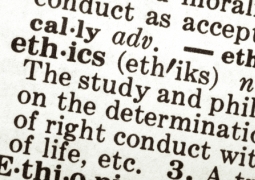
The Joint Committee on Ethics and Members’ Interests presented the 2017 Register of Members’ Interests during a media briefing held at Parliament today. The principles to safeguard the pillars of our democracy hinge on Parliament’s ability to codify ethical norms and standards that Members of Parliament must adhere to to uphold openness and transparency, to be seen to be fit and proper to legislate and conduct oversight over the executive. This realisation has led to the inception of a Handbook on Parliamentary Ethics and Conduct. This expands upon the emerging international standards that seek to benchmark Members’ ethical conduct.
Giving a context to the presentation of the 2017 register, one of the Co-Chairpersons of the committee, Mr Amos Masondo, who represents the National Assembly, stated that the presentation of the register to the public is an attempt to instil public trust and confidence in Parliament. “We commend the fact that all Members of Parliament have obliged and disclosed their interests. This will go a long way in instilling public trust and confidence in Parliament.”
He admitted that there were late submissions, though. “Those cases were referred to the sub-committee of the Ethics Committee and dealt with per merit.”
Another Co-Chairperson of the committee, Mr Aumsensingh Singh, who represents the National Council of Provinces, gave a detailed timeline of the process of submission and deadlines thereof. “The deadline for the current register was 30 December 2017, they were due to be verified in February 2018 and that was done and finalised in March 2018.”
“Forty-two Members missed the deadline and made late submissions. But if there is a breach of the ethics code, a complaints procedure should be followed with regard to that, but it is not punitive.”
Asked what sanctions are in place to ensure that Members stick to the submission time frames of the committee, Mr Sigh replied: “As I said, the sanctions are not punitive, if a Member is found to have transgressed the ethics code, he or she can be reprimanded in the House, be fined not an amount exceeding the 30 days of his or her salary. Or can be suspended from attending the sittings of the Houses or the committees.”
If there are minor breaches, we counsel the Member concerned in relation to the guidelines of the code, he added.
Mr Masondo interjected that if necessary, stiffer sanctions can be imposed and both Houses can make such recommendations.
On outstanding cases, Mr Masondo stated that to date, the committee has considered 36 outstanding cases, of these, 16 have been finalised, 10 are ready for consideration, eight are under investigation and two have been finalised.
Asked if they would consider naming and shaming the transgressors of the ethics code, Mr Masondo did not oblige. “We will rather not talk about names when the process is still under way. Remember, according to the rules, Members of Parliament must be given an opportunity to explain why they declared late. That entire process is now in the hands of the sub-committee. When it is done we will write a report and table it before both Houses of Parliament.”
Reiterating his point, he stated that there was no need to name and shame anyone because when the committee is finished with its work, the register is made public as is the case now. “What we don’t want to do is to name and shame people when our processes of verification of transgressions are under way.”
Given that we are currently halfway through 2018, the committee was asked WHEN will it conclude the 2018 register considering that the 5th parliamentary tenure is almost coming to an end. “We intend to finish the 2018 register between now and the end of May 2019, assuming that the elections will be held in May 2019. If not, we will ensure that we do so not later than 90 days thereafter,” said Mr Masondo.”
According to the report, the number of Members of Parliament who made late disclosures increased from 17 in 2016 and 44 in 2017, the committee was asked if there are any measure in place to curb this in future. “Cases vary. There are those who could not submit due to ill-health and we must give due consideration to that. As such, each case should be dealt with on merit.”
Asked how does the committee verify the veracity of the information submitted to it, Adv Ntuthuzelo Vanara, Acting Registrar of Members’ Interests, stated that they have a contract with Companies and Intellectual Property Commission and the committee could access its data and verify such information. “If there is a need of any correction or amendments to such information, we ask the Member to do so.”
By Abel Mputing
5 May 2018

